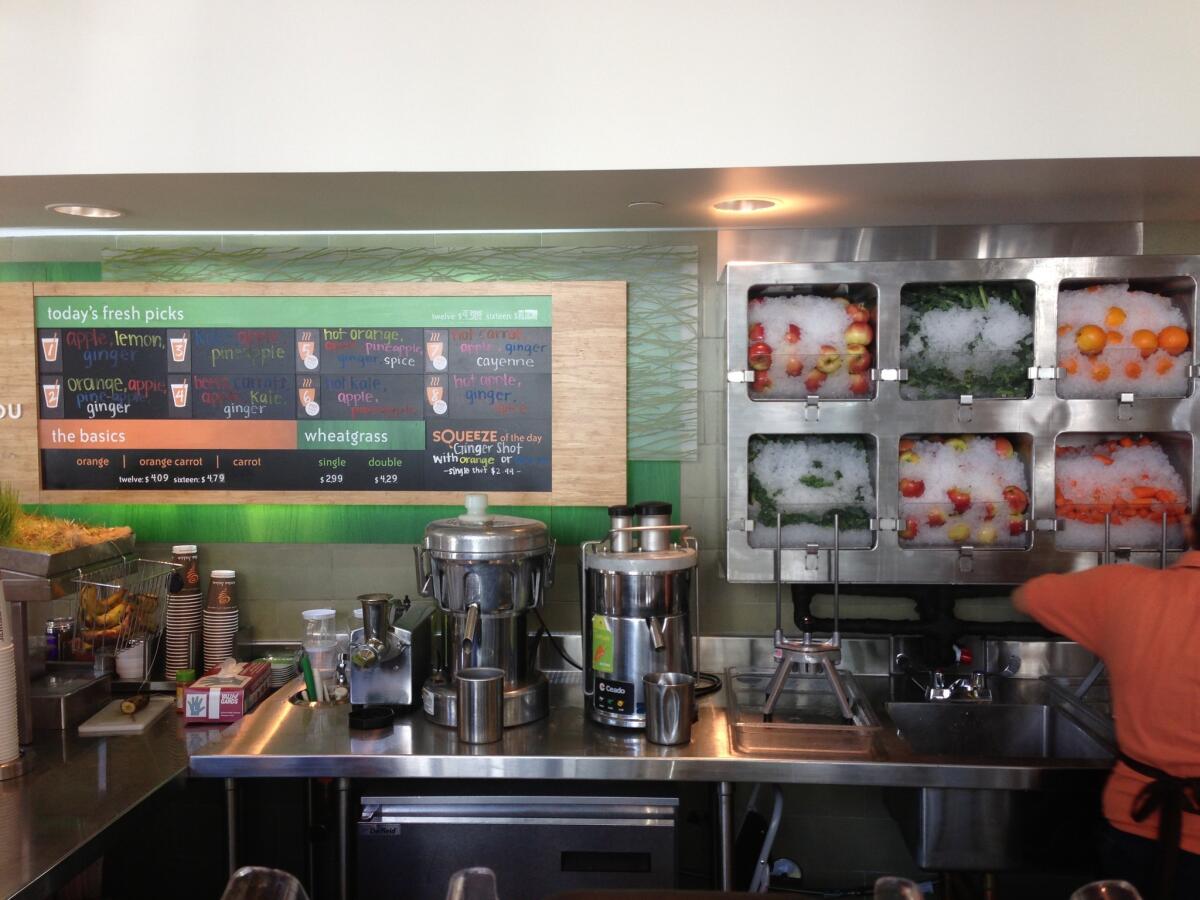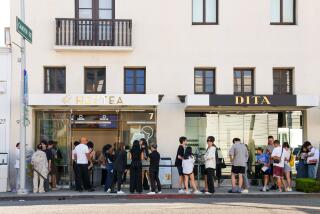Jamba Juice tries new stores (drive-throughs!), juices (kale!)

- Share via
Jamba Juice is about to live up to its name.
The Bay Area company is best known for smoothies such as Mango-a-Go-Go and Razzmatazz. But starting Thursday, it’s throwing the blender at fresh-squeezed juices and expanding its current lineup of orange, carrot and wheat grass juice to include eight options made with apples, lemons, ginger, pineapples, beets and kale.
That includes chilled choices such as a mix of orange, apple, pineapple and ginger, all pressed on the spot. There are also hot juices inspired by Jamba fans in South Korea.
And it’s not just the fruit-and-vegetable medley that’s “on-trend,” as Jamba calls the ingredients. The juice rollout is being paired with a new store prototype debuting Thursday in Santa Monica, a city already crammed with juice bars and juice cleanse devotees.
The Jamba location features brighter colors and a design that highlights the juicing operation -- a display of ice-packed produce, a tub of growing wheat grass and a farm-stand-style chalk menu -- and pushes the smoothie ordering station to the back.
The shop is the first of about 100 stores to be revamped this year, mostly in California and New York, according to Jamba. The branches will get their produce from a supply chain “that’s more local than not,” said Chief Executive James White.
Going organic, however, “won’t be a priority,” he said.
Rivals such as Starbucks are also rediscovering the lucrative wonders of fresh juice as consumers increasingly look for healthful, convenient beverages. The Seattle giant opened its Evolution Fresh juice store in March in Washington state and is gradually expanding the chain’s reach.
“We’ve seen what they’ve done, but we’re really confident that there’s nobody in the marketplace that will match the quality of our offerings and the scale of our work,” White said of Starbucks. “Competition really only helps us elevate our game.”
White joined Jamba in 2009. Since then, he’s revamped a company weighted down by overambitious growth plans and poor real estate choices. Until fiscal year 2011, the business hadn’t seen positive same-store sales growth in four years.
Jamba closed a number of stores in 2008 and 2009 and transitioned from a model in which 70% of stores were company-owned to one that is 60% franchised.
The company expanded abroad selectively and is now present in South Korea, the Philippines and Canada. It expects to have an additional 300 locations in those markets over the next five to seven years.
The brand began offering more good-for-you options, including all-fruit smoothies and the option to make more menu items “light,” or less than 250 calories. Like Starbucks, it began moving into teas with last year’s acquisition of Chicago-based Talbott Teas.
The company said it hopes to open between 60 and 80 full Jamba Juice locations globally in 2013, and wants to add up to 100 branches of a new Smoothie Station concept featuring a smaller real estate footprint and a more limited menu.
Up to 1,000 more JambaGo self-serve kiosk machines in schools, convenience stores and other properties are in store, as are several locations of a drive-through prototype.
ALSO:
U.S. wine exports hit record, China sales up 18%
Craft brewers say new glass makes their beer taste better
Donkey and water buffalo found in South African burgers
More to Read
Inside the business of entertainment
The Wide Shot brings you news, analysis and insights on everything from streaming wars to production — and what it all means for the future.
You may occasionally receive promotional content from the Los Angeles Times.











